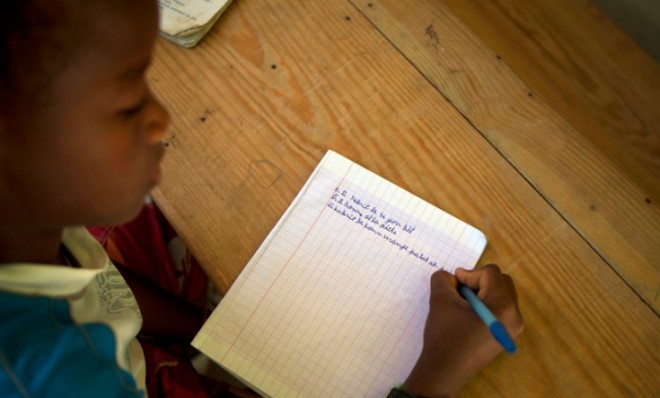Haiti is teaching kids in the wrong language
Most Haitians speak Haitian Creole. And yet, the country's traditional language of education is French — which less than 10 percent of Haitians speak fluently


A free daily email with the biggest news stories of the day – and the best features from TheWeek.com
You are now subscribed
Your newsletter sign-up was successful
Haiti is beset by crushing poverty, inadequate infrastructure, and dozens of other obstacles preventing kids from getting a good education, prompting several organizations to take steps to eliminate the one obstacle that is easiest to do something about: language.
Though most children in Haiti speak Haitian Creole, the traditional language of education has always been French. While Creole is historically related to French, the structure and vocabulary of the two languages are different enough that they are barely mutually intelligible. As Trenton Daniel explains in this AP article, French "remains the primary language of instruction in most Haitian classrooms. In fact, less than 10 percent of the country's 10 million people speak French fluently, and in most schools, even the teachers don't understand it very well although they're asked to teach in it."
Why would the educational system be based on a language that neither the teachers nor the students speak very well?
The Week
Escape your echo chamber. Get the facts behind the news, plus analysis from multiple perspectives.

Sign up for The Week's Free Newsletters
From our morning news briefing to a weekly Good News Newsletter, get the best of The Week delivered directly to your inbox.
From our morning news briefing to a weekly Good News Newsletter, get the best of The Week delivered directly to your inbox.
Part of the reason is confusion about the nature of Haitian Creole. It seen by many as a broken and deficient form of French, and it is thought that when people use it they are speaking French, just not very well. From this point of view, education is a matter of correcting language, and access to other subjects — reading, math, history — is dependent on first making that correction. What that means in practical terms is that not only do students not learn French very well, they don't get the other subject matter either.
The other reason that French has held on as the language of instruction is the inertia of tradition-bound institutions. French was the language of colonial administration and has become the language of the elite in Haiti. If only the elite have access to education, they are well served by French, but if the rest of the country is to have access too, the extra barrier should be removed.
None of this is to say that French is not useful. Some have argued that to deny people an education in French is to deny them access to a global language in favor of a provincial one. But children can learn French, or any other global language, once they have learned how to learn in their primary language. There are fewer speakers of Estonian, Icelandic, and Danish than there are of Haitian Creole, but no one is suggesting that speakers of those languages give up their primary language of instruction for a global language. In fact, they manage to learn both provincial and global languages quite well.
Three years after the earthquake and the subsequent millions of dollars in pledges to reform the education system in Haiti, things are finally starting to change. The Louverture Cleary School, a private Catholic institution, is using Creole in the classroom and says 98 percent of its students pass the national high school exam. The national average? Thirty percent. The AP article continues:
A free daily email with the biggest news stories of the day – and the best features from TheWeek.com
"We have lost, we have wasted, so many Einsteins because of the language barrier," said Michel DeGraff, a leading Creole scholar and Haiti-born linguistics professor at the Massachusetts Institute of Technology. DeGraff led a four-day workshop in January to help Haitian teachers incorporate Creole into math and science curricula, challenging the notion that the language is not sophisticated enough for the hard sciences. [AP]
Other organizations have also begun to develop materials for a Creole-based curriculum, and attitudes toward the language may be changing for the better. Back at the Louverture Cleary School, a question is painted on the wall in Creole: "Nou pare poun rebate ayiti, e ou?" — "We're ready to rebuild Haiti, are you?"
Arika Okrent is editor-at-large at TheWeek.com and a frequent contributor to Mental Floss. She is the author of In the Land of Invented Languages, a history of the attempt to build a better language. She holds a doctorate in linguistics and a first-level certification in Klingon. Follow her on Twitter.
-
 ‘Poor time management isn’t just an inconvenience’
‘Poor time management isn’t just an inconvenience’Instant Opinion Opinion, comment and editorials of the day
-
 Bad Bunny’s Super Bowl: A win for unity
Bad Bunny’s Super Bowl: A win for unityFeature The global superstar's halftime show was a celebration for everyone to enjoy
-
 Book reviews: ‘Bonfire of the Murdochs’ and ‘The Typewriter and the Guillotine’
Book reviews: ‘Bonfire of the Murdochs’ and ‘The Typewriter and the Guillotine’Feature New insights into the Murdoch family’s turmoil and a renowned journalist’s time in pre-World War II Paris
